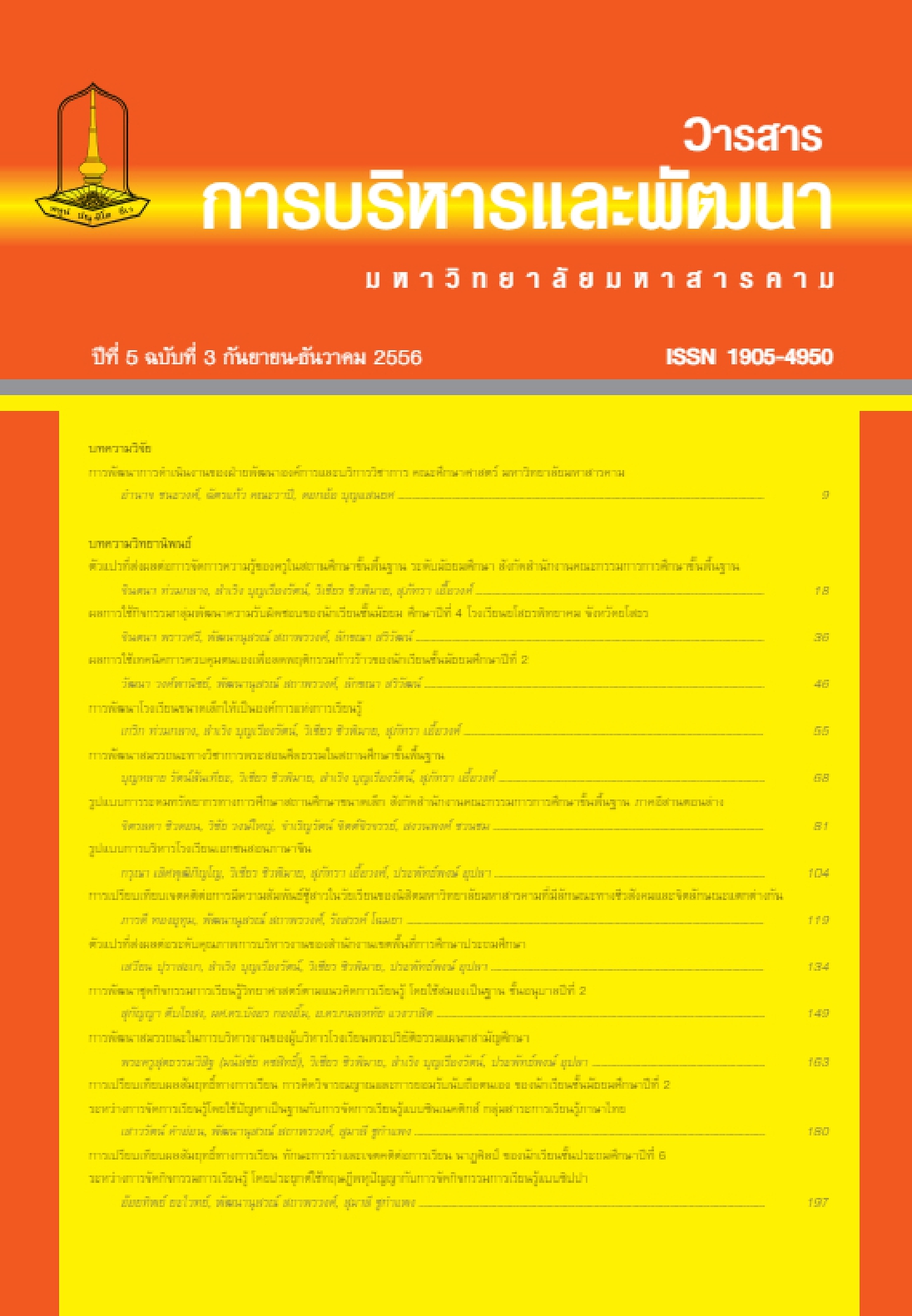A DEVELOPMENT OF MORAL TEACHING MONK ACADEMIC COMPETECY IN BASIC EDUCATION SCHOOLS.
Main Article Content
Abstract
This research aimed to 1) study the level of the academic competency of morals teaching monks in basic education schools and 2) develop the academic competency of morals teaching monks in basic education schools. The research was carried out in three steps. The first step was studying the academic competency of 60 morals teaching monks from 60 schools which were selected from 1,543 basic education schools from four provinces, namely Chaiyaphum, Nakhon Ratchasima, Buriram, and Surin, under the Office of Basic Education Commission, Ministry of Education in the academic year 2011. The schools were selected proportional to the number of students in each school. The second step was selectively inviting 25 experts to witness the results of the academic competency evaluation of morals teaching monks in basic education schools based on the first step’s results and to provide additional comments. Finally, the third step was developing the academic competency of selectively chosen 16 morals teaching monks in basic education schools who would participate in a workshop led by experts.
The research revealed that 1) the behaviors, disciplines, and morality of morals teaching monks in schools were in the ‘very good’ level, their core competency was in ‘good’ level, their functional competency was in ‘good’, and their fundamental knowledge of teaching profession was in ‘averagely good’ level. Accordingly, the 25 experts proposed the urgent development of the six competencies which were rated in the research as ‘averagely good’ of morals teaching monks in the basic education schools. The six competencies included 1) learning management, 2) learner development, 3) classroom management, 4) analysis, synthesis, and research, 5) knowledge in philosophy of education, and 6) psychology of learning. These six competencies covered five essential points which were 1) quality lesson plans, 2) quality teaching preparation, 3) quality learning and teaching management, 4) learner development and quality class materials and learning media, and 5) quality learning evaluation tools. These five essential points embraced the six academic competencies of morals teaching monks as mentioned above.
2) Out of the total scores of 30 of the test taken prior to the training on the development of the academic competency of morals teaching monks in basic education schools, the monks averagely got 15 which was 50 percents whereas on the test taken after the training, they got 26.25 which was 88 percents. Their scores increased with statistical significance at the level α of .01; and they also rated from ‘high’ to ‘highest’ assessment levels relating to their own knowledge, understanding, and utilization of what they had learned from the training. Through observing their hands-on teaching practice after the training, mentor teachers assessed the academic competency of the morals teaching monks in basic education schools. The assessment results of the five essential points of their teaching performance were 1) ‘very good’ quality lesson plans, 2) ‘very good’ quality teaching preparation, 3) ‘very good’ quality learning and teaching management, 4) ‘good’ learner development and quality class materials and learning media, and 5) ‘good’ quality learning evaluation tools.
Downloads
Article Details
References
Chantranee Sa-nguannam. (2001). Educational Personnel Training. Bangkok: Sri-anan Printing.
Office of National Buddhism. (2003). Report on Social Situation. Bangkok: The Office of National Economic and Social Development Board.
Office of National Education Commission. (2002). Leadership Competency for Teachers. (online). Retrieved on April 9, 2010, from Phra Dhammapitaka (Prayudh Payutto). (1994). The Significance of Buddhism as A National Religion of Thailand. 7th Edition. Bangkok: Sahadhammika.
Phramaha Somsak Sriboriboon. (2008). The Study of Guidelines for the Improvement of Teaching Competency of Monks Teaching Morals in Secondary Schools under the Office of the Basic Education Commission in Bangkok Metropolitan Area. Master of Education Thesis. Education Administration Program. Bangkok: Graduate School, Srinakharinwirot University.
Phrathai.net, Thai Monk Internet Community. (2549). Buddhism News Center. (online). Retrieved September 8, 2006, from http://www.phrathai. net/news/detail.php?catid=6&groupid=0&ID=3135.
Religious Affairs Department. (2005 A). Operational Manual for the Project of Monks Teaching Morals in Schools. Bangkok: The Express Transportation Organization of Thailand Printing House.
Religious Affairs Department. (2005 B). Summary Report on the Overall Operation of the Project of Monks Teaching Morals in Schools in the Fiscal Year 2005. Bangkok: Moral and Ethical Promotion Bureau, Religious Affairs Department.
Sawat Mee-ob et al. (2001). The Study of Problems in the Administration of the Dhamma Section in the Phrapariyattidhamma School in Kamphaeng Phet Province. Kamphaeng Phet: Pimlak.
Worapong Boonpan. (2001). Problems in Ethics Teaching and Learning of Primary 5-6 in Schools under Chiang Mai Municipality. Master Thesis. Faculty of Buddhism. Chiang Mai: Mahachulalongkornrajavidyalaya University. Feldman, Susan. (January 1998). “Advances in Digital Library 1998.” Information Today. 16 (6): 17-24.


